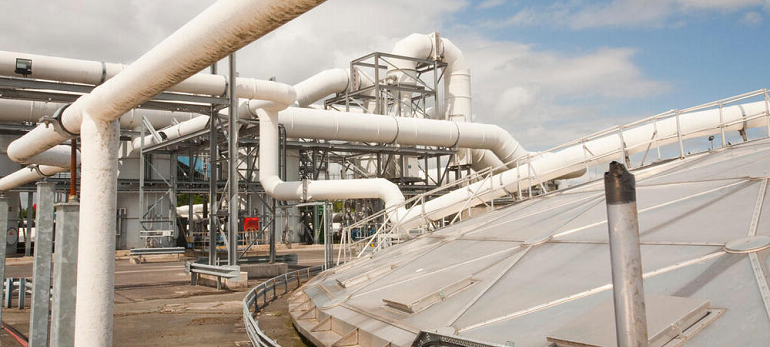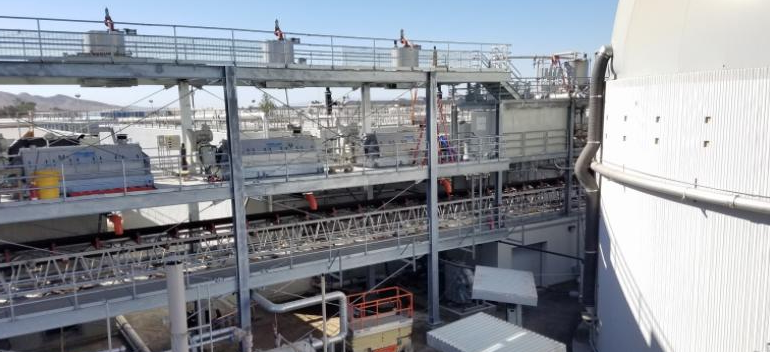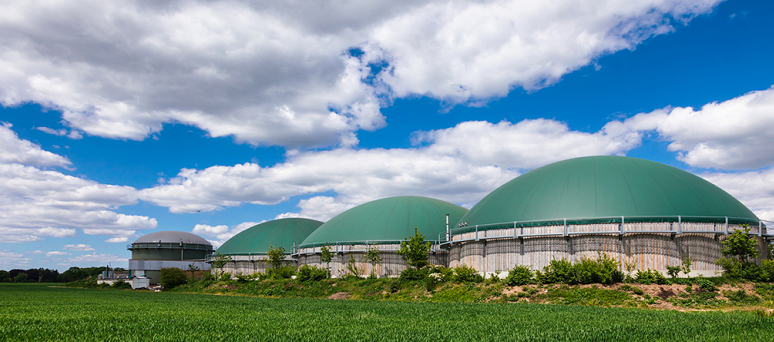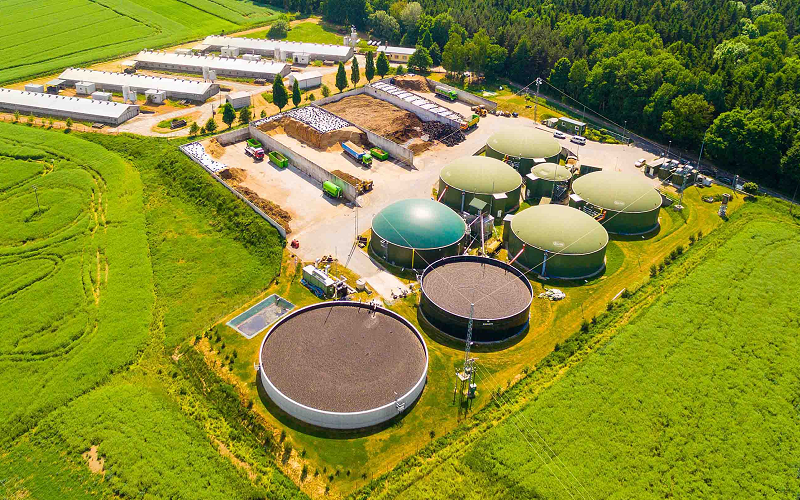Biogas is a gas fuel produced from biomass either through decomposition or chemical processes. It consists of 50-75% methane, with the rest being carbon dioxide and traces of other substances. Biomethane, which is a purified form of biogas, is a replacement for fossil fuel-based natural gas and is used for generating electricity, transportation, heating, and cooking. In the US, the majority of biogas produced is utilized for electricity generation.
What Is Biogas?
Biogas is a renewable source of energy that is produced from organic matter, such as agricultural waste, food waste, sewage, and other organic materials. The organic matter is broken down through anaerobic digestion, which is the process of breaking down organic matter in the absence of oxygen. This process produces a mixture of gases, including methane and carbon dioxide. The biogas that is produced through anaerobic digestion can be captured and used as a fuel.
Biogas is composed of 50-75% methane, which is a powerful greenhouse gas that is 21 times more potent than carbon dioxide. The rest of the biogas is made up of carbon dioxide and trace amounts of other gases, such as nitrogen, hydrogen, and hydrogen sulfide. The methane in biogas can be cleaned and upgraded to biomethane, which is nearly pure methane. This purified biomethane can be used as a direct substitute for natural gas, which is a fossil fuel.

Biogas has several important applications. For example, it can be used to generate electricity by running it through a generator. It can also be used as a fuel for vehicles, such as buses and trucks, as well as for heating and cooking in homes. Biogas is a clean and renewable energy source that can reduce dependence on fossil fuels and help mitigate the impacts of climate change. Additionally, biogas can help reduce the amount of waste that goes to landfills, as well as reduce emissions of methane, a potent greenhouse gas, from landfills.
In the United States, the majority of biogas is produced for use in electricity generation, but there is growing interest in using biomethane for transportation and heating applications as well. Biogas systems are typically set up on farms, landfills, and wastewater treatment plants, where there is a constant supply of organic waste. These systems can also be set up on a smaller scale for homes and businesses, where food waste and other organic materials can be used to generate energy.
How Is Biogas Made?
Biogas is made through the process of anaerobic digestion. In this process, organic matter, such as food waste, agricultural waste, sewage, and other organic materials, is placed in a sealed container called a digester. The organic matter is then broken down by microorganisms in the absence of oxygen, producing a mixture of gases including methane and carbon dioxide.
The biogas produced in the digester is then captured and stored, typically in a gas storage tank. From there, it can be used as a fuel for various applications, such as electricity generation, heating, cooking, and transportation. The biogas can also be cleaned and upgraded to biomethane, which is nearly pure methane, by removing impurities such as carbon dioxide and hydrogen sulfide.
Anaerobic digestion is a simple and effective way to produce biogas and to reduce the amount of organic waste that goes to landfills. By using biogas as a fuel, we can also reduce our reliance on fossil fuels and help mitigate the impacts of climate change. Additionally, biogas systems can be set up on a small or large scale, making it a flexible and accessible technology for producing renewable energy.

Biogas Environmental Benefits
Biogas is a renewable energy source that has several environmental benefits compared to traditional fossil fuels. One of the primary benefits of biogas production is its potential to mitigate the effects of climate change. By reducing the amount of organic waste that goes to landfills, where it produces methane, a potent greenhouse gas, biogas production can help lower greenhouse gas emissions. In addition, biogas production reduces the demand for non-renewable fossil fuels, which are a significant source of greenhouse gas emissions.
Another benefit of biogas is that it is a renewable energy source. As long as there is a supply of organic waste, biogas can be produced continuously, making it a sustainable alternative to fossil fuels. In addition, using organic waste to produce biogas helps reduce the amount of waste that goes to landfills, where it contributes to pollution and greenhouse gas emissions.
Biogas is also a clean-burning fuel, which means that it produces fewer air pollutants compared to fossil fuels. This can have a positive impact on air quality and reduce the impacts of air pollution on human health and the environment. Furthermore, biogas systems can be set up on a small or large scale, making it a flexible and accessible technology for producing renewable energy. This allows for decentralized energy production, reducing the need for large, centralized power plants and the associated transmission and distribution infrastructure.
The environmental benefits of biogas make it an important tool for reducing our dependence on fossil fuels and mitigating the impacts of climate change. By using biogas, we can reduce waste, improve air quality, and transition to a more sustainable energy system.

The Consequences of Burning Biogas
Burning biogas, as with any energy source, has both advantages and disadvantages. Although biogas is considered a clean-burning fuel compared to fossil fuels, it still produces emissions, such as carbon dioxide and water vapor, when burned. These emissions, while lower in comparison to fossil fuels, are still a contributor to climate change. Additionally, biogas has a lower energy density, meaning that a larger volume of biogas is needed to produce the same amount of energy, which could potentially affect the efficiency of energy production and increase the costs associated with producing and using biogas.
It is also important to consider the maintenance and repair requirements of biogas production systems, such as digesters and gas storage tanks, which can add to the costs of producing and using biogas. Safety is also a concern, as biogas is flammable and can pose a risk if not handled properly.
Despite the consequences of burning biogas, it remains a cleaner alternative to burning fossil fuels and can provide significant environmental benefits, including a reduction in the demand for non-renewable fossil fuels and a transition to a more sustainable energy system. One should consider both the benefits and consequences of biogas when making decisions about energy production and use.
Is Biograss Carbon Neutral (Sustainable)?
Biogas is considered a carbon-neutral energy source because the carbon dioxide emissions produced during combustion are offset by the carbon dioxide captured during the production of the biogas from organic waste. In other words, the carbon cycle is closed, and the same amount of carbon dioxide is captured as is released during combustion.
However, the sustainability of biogas production depends on several factors, including the source of the organic waste used to produce the biogas, the efficiency of the production process, and the end-use of the biogas. If the organic waste used to produce biogas is sourced sustainably and the production process is efficient, biogas can be considered a sustainable energy source.
It is important to note that while biogas production can provide environmental benefits and is considered a renewable energy source, it is not a perfect solution. The sustainability of biogas production can be affected by factors such as the use of inputs with a high carbon footprint, the release of pollutants during production, and the disposal of by-products.
Biogas can be considered a sustainable energy source if it is produced in an environmentally responsible manner, using sustainable inputs and minimizing emissions and waste. However, the sustainability of biogas production should be considered in the context of the overall energy system and evaluated on a case-by-case basis.

